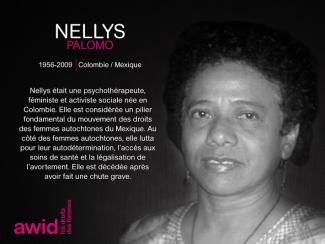Les résultats de votre recherche façonneront également vos plaidoyers. Par exemple, vos résultats auront cerné les secteurs qui accordent le plus de financements et les secteurs qui vous semblent nécessiter une certaine sensibilisation auprès des donateurs.
Dans cette section
Élaborez votre stratégie de plaidoyer
Dans la section Établir le cadre de référence de votre recherche de cette boîte à outils, nous vous recommandons de fixer les objectifs que vous voulez atteindre à travers votre recherche. Ces objectifs vous permettront d’élaborer une stratégie de plaidoyer lorsque votre recherche sera terminée.
Une stratégie de plaidoyer représente un plan de distribution des résultats de votre recherche de manière à ce que vous atteigniez vos objectifs. Cette démarche s’inscrit dans le but plus vaste de promouvoir auprès des secteurs clés des changements positifs dans le domaine des ressources destinées aux efforts d’organisation liés aux droits des femmes.
À l’aide des objectifs définis dans le cadre de référence de votre recherche :
- Dressez la liste de tous les groupes qui pourraient éventuellement s’intéresser aux résultats de votre recherche.
- Pour chacun des groupes, expliquez en une phrase comment ils pourraient vous aider à atteindre vos objectifs.
- Pour chacun des groupes, indiquez le ton que vous devez utiliser lorsque vous parlez avec eux (formel, professionnel, commentaires à bâtons rompus, est-ce qu’ils comprennent le jargon du domaine ?).
- Dressez la liste de tous les médias qui vous permettent de rejoindre ces publics, sur un ton approprié (réseaux sociaux pour stimuler l’esprit communautaire, communiqués de presse pour les annonces officielles au grand public, etc.).
De cette liste, la plus complète possible, choisissez les éléments qui sont les plus efficaces pour atteindre vos objectifs (voir plus loin les exemples de publics spécifiques et les méthodes de plaidoyer).
Lorsque votre stratégie est achevée, vous pouvez commencer la diffusion.
Haut de page
Prenez contact avec votre réseau
Pour diffuser vos résultats, contactez d’abord les personnes ou les organisations à qui vous avez distribué votre sondage, ainsi que toutes les personnes interviewées.
- Premièrement, profitez de l’occasion pour les remercier de leur contribution à cette recherche.
- Partagez avec elles les principaux résultats et analyses du sondage.
- Facilitez la tâche de ceux et celles qui distribueront votre produit par le truchement de leurs réseaux, en leur offrant des exemples de tweets, de messages Facebook ou même une courte introduction qu’ils pourraient copier et coller dans leur site Web.
N’oubliez pas d’identifier clairement une personne-contact et demandez une confirmation lorsque le rapport aura été affiché.
Cela vous permettra non seulement de savoir qui a diffusé votre rapport, mais vous aurez aussi l’occasion de renforcer vos relations au sein de votre réseau.
Haut de page
Adaptez votre stratégie au secteur
À titre d’exemple, nous proposons ci-dessous une liste de secteurs que mobilise l’AWID dans ses efforts de plaidoyer.
- Utilisez cette liste comme point de part pour élaborer un plan de plaidoyer propre à chaque secteur.
- Fixez un objectif décrivant ce que vous espérez accomplir dans chaque secteur.
- Assurez-vous d’ajouter à cette liste tout secteur pertinent dans le cadre de votre recherche, notamment les ONG locales ou les gouvernements locaux.
La liste des organisations et des individus qui vous ont conseillé-e-s sera également utile. Ces personnes peuvent non seulement vous aider à diffuser votre rapport dans divers espaces, mais aussi vous faire connaitre de nouvelles organisations ou sphères de plaidoyer.
1. Organisations de droits des femmes
Exemple d’objectifs : informer les organisations de droits des femmes des nouvelles tendances de financement ; à l’aide des résultats de la recherche, proposer des séances de réflexion sur les efforts collaboratifs en matière de mobilisation des ressources ; influencer la manière dont elles approchent la mobilisation des ressources.
Exemples de méthodes de plaidoyer :
-
Offrez des séminaires, des cafés d’apprentissage ou d’autres activités dans toute votre région, dans la langue qui convient, sur les résultats de votre recherche.
-
Si vous ne pouvez atteindre tout le monde physiquement, pensez à organiser un webinaire et à concevoir des présentations en ligne.
-
Présentez vos résultats lors de rencontres d’envergure, comme les sessions de la Commission de la condition de la femme des Nations Unies (CSW).
-
Au-delà des bulletins et sites Web de votre organisation, rédigez des articles sur diverses plateformes que fréquente votre public cible.
Exemples : World Pulse, OpenDemocracy (principalement en anglais), feministing (en anglais).
2. Agences bilatérales et multilatérales
Exemple d’objectif : sensibiliser le public à la manière dont les financements actuels ne respectent pas les engagements convenus et à la manière dont ce secteur doit améliorer ses mécanismes de financement soutenant les efforts d’organisation liés aux droits des femmes.
Déterminez les agences bilatérales et multilatérales qui ont le plus d’influence sur les financements, y compris les ambassades locales.
Exemples de méthodes de plaidoyer :
- Recrutez des organisations et des individus alliés et influents (peut-être ceux et celles qui vous ont conseillé-e-s lors de cette recherche) afin qu’ils organisent des activités de sensibilisation.
- Sollicitez leur appui pour diffuser vos résultats auprès de grandes agences multilatérales (comme les Nations Unies).
- Présentez vos travaux et/ou participez à des rencontres dans des espaces que fréquentent les agences bilatérales et multilatérales, notamment GENDERNET.
- Publiez des articles dans les sites et publications que consultent les agences bilatérales et multilatérales, comme devex, Better Aid, Publish What You Pay.
3. Fondations privées
Exemple d’objectif : Améliorer la qualité et la quantité de soutien aux organisations de droits des femmes.
Exemples de méthodes de plaidoyer :
- Présentez vos résultats ou participez à des activités menées par des fondations privées.
- Approchez les fondations privées par le truchement de groupes d’appartenance comme l’International Human Rights Funders Group ou le African Philanthropy Network (sites en anglais). Proposez des sessions dans le cadre de leurs activités.
- Contactez des alliances d’octroi de subventions qui sont progressives, comme EDGE Funders, pour la diffusion de vos résultats et d’éventuelles présentations.
- Publiez des articles dans les sites et publications que consultent les bailleurs de fonds privés, comme The Chronicle of Philanthropy et Alliance Magazine (sites en anglais).
4. Fonds pour les femmes
Exemple d’objectif : Les encourager à poursuivre leur travail à plus grande échelle.
Exemples de méthodes de plaidoyer :
- Organisez des présentations destinées aux fonds pour les femmes de votre région et dans les pays que vous souhaitez influencer.
- Diffusez les résultats de votre recherche à tous les fonds pour les femmes qui ont un impact sur la région, les questions prioritaires ou la population sur lesquelles votre recherche est axée.
- Pensez à organiser des efforts conjoints, selon les résultats de la recherche. Vous pourriez par exemple proposer de collaborer avec un fonds pour mettre en place une subvention qui permettrait de combler les écarts de financement constatés dans votre recherche.
5. Secteur privé et nouveaux donateurs
Exemple d’objectif : Améliorer leur compréhension du domaine et les encourager à renforcer la cohérence entre leurs intérêts philanthropiques et leurs pratiques commerciales.
Exemples de méthodes de plaidoyer :
- Recrutez des organisations et des individus alliés et influents (dont certains font sans doute partie de ceux et celles qui vous ont conseillé-e-s lors de ce processus de recherche) afin qu’ils organisent des activités de sensibilisation des pairs.
- Suscitez des rencontres avec les acteurs et actrices influents du secteur privé pour y présenter les résultats de votre recherche.
- Organisez votre propre rencontre en invitant les acteurs et actrices du secteur privé afin de partager les résultats de votre recherche et de promouvoir votre position.
Assurez-vous d’adapter vos présentations, propositions et vos demandes à chaque groupe ciblé.
Haut de page
Étape précédente
8. Finalisez et mettez en forme
Êtes-vous prêts-tes à commencer votre propre recherche ?
Nous vous recommandons fortement de rempli vous-même la Fiche de travail « Êtes-vous prêts-tes ? » afin d’évaluer votre propre niveau de préparation.














